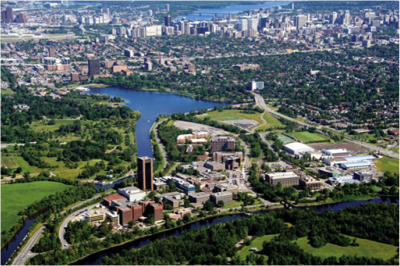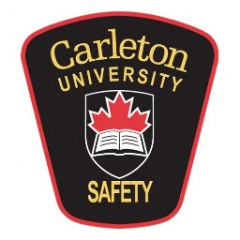By Alexandra Zannis, CFICE Volunteer
 I often view Carleton University as being an island. Contained within the school borders is a city within a city, complete with its own political organization, economy, and culture. Given that it is surrounded by rivers and is slightly removed from Ottawa’s core, Carleton University also physically embodies this segregated and slightly removed form of social organization.
I often view Carleton University as being an island. Contained within the school borders is a city within a city, complete with its own political organization, economy, and culture. Given that it is surrounded by rivers and is slightly removed from Ottawa’s core, Carleton University also physically embodies this segregated and slightly removed form of social organization.
As its own sort of quasi-city with a student population of roughly 29,000, Carleton University offers a multitude of different campus services to create an ecosystem where all can study, work and live in a safe environment. No different from any other university, it blends educational services with health and wellness services to meet its population’s needs. Carleton University also creates and implements policies and mandates meant to help “govern” the work that takes place on its campus. This governance includes a commitment to upholding basic rights such as non-discrimination or universality for all individuals on its campus.
As a Carleton University student myself, and specifically a social work student working in human rights, this idea of Carleton as a “city” recently got me thinking: In what ways does Carleton University uphold its “citizens’” basic human rights? When someone has a concern, complaint, or simply requires support outside of their academic studies, where do they go?
The answer I found: Equity Services.
What is Equity Services and how do they operate?
After Carleton’s review of their human rights policies and procedures in 2001, the University’s Senate and Board of Governors provided the means to create Equity Services with the goal of creating a university space that truly is for everyone. To achieve this goal, Equity Services operates within a human rights framework, and includes as part of its mandate the pursuit of knowledge, personal and intellectual growth, and a campus free from discrimination, injustice, and violence. They are a frontrunner for establishing research, training and programming that is rooted in social justice and human rights.
Working under a human rights framework means that individuals have definite rights that must be upheld simply because they are human. A human rights framework protects civil, political, economic, social, and cultural rights, which are rights like universality, participation or non-discrimination. Included in protecting these rights is the ability for individuals to report human rights infringements and violations.
According to Bailey Reid, an Equity Advisor with Equity Services, there are three core components to their work at Carleton: maintaining the Centre for Indigenous Initiatives, providing confidential human rights advice and assistance, and delivering sexual assault support services and prevention initiatives. Through these three areas, Equity Services offers a reporting mechanism to help individuals address human rights violations on campus. They team up with partners on and off campus to host trainings and workshops, such as welcoming Emma Sulkowicz, a sexual assault awareness activist from Columbia University, or promoting the Ontario Human Rights Commission on-line training to all individuals, students and especially staff, in the Carleton community. And they work to specifically promote Indigenous outreach, retention and culture by offering training sessions, workshops, guest lectures, and experiential learning opportunities through the Centre for Indigenous Initiatives.
Equity Services is also involved in helping to develop policies and practices at Carleton University to build the most inclusive and equitable campus possible. As Reid explains, “The Centre works to advocate for changes within Carleton’s policies and procedures to better support the diverse population at Carleton. Ongoing training and education to students, staff and faculty on human rights and equity issues as well as responding to specific requests and corrective measures are taken following a complaint.” Some examples of this advocacy work include the establishment and maintenance of the University’s employment equity program; an all-inclusive washroom initiative; and the development of an inclusive and accessible event planning checklist for anyone organizing an event on campus.
How does Equity Services best ensure an equitable campus?
 One of the ways Equity Services successfully champions an equitable campus is by partnering with other offices, departments, and services on campus to collaboratively build a safe, inclusive campus environment. Their partnership with Safety Services is a good example of how Equity Services works with others to promote a human rights framework and safeguard student and faculty success.
One of the ways Equity Services successfully champions an equitable campus is by partnering with other offices, departments, and services on campus to collaboratively build a safe, inclusive campus environment. Their partnership with Safety Services is a good example of how Equity Services works with others to promote a human rights framework and safeguard student and faculty success.
According to Special Constable Nick Saucier, “Campus Safety Services has an excellent working relationship with Equity Services. Our services and mandates sincerely complement one another and the work that we both do.” Saucier also notes that campus safety officers and staff receive training from Equity Services on how to best support individuals, including how to explain legal and social rights to clients.
The partnership between these two campus hubs allow for a wealth of programming and services to be delivered, as well as the development of unique educational materials that help promote a safe and cohesive environment. Whether it is sexual assault educational programming, or explaining the Charter of Rights and Freedoms to clients, Saucier notes that both organizations approach it from a human rights framework.
By working with partners like Safety Services to deliver programming, Equity Services creates a space where multiple campus organizations can share their knowledge and expertise to create more equity for all.
Why is having a department like Equity Services important for a University Campus?
The push for more human rights centered programming is not a new phenomenon. However, in recent years it has become a focal point for universities to ensure equitable services are available and are anti-oppressive in nature. Campuses function best when everyone is working together to build a stronger and more unified approach to addressing concerns and interpersonal problems. Just like cities, a campus can offer services and produce research that includes diverse voices ONLY if they have an outlet to find those voices. And of course, research and services gathered and offered through a human rights based lens result in more inclusive programming that is representative of the intended populations being served.
Having a hub like Equity Services that makes this inclusive approach to research and service provision even more accessible is a huge benefit to the thousands who utilize Carleton’s services every day. In my opinion, the more human rights frameworks applied to services, the better the outcomes we see when individuals have to make the hard decisions to ask for accommodations or file a complaint. Human rights based services help get students and faculty back to their lives through support, accommodation and increased training.
What does an article on Equity Services have to do with community-campus engagement?
For researchers hoping to make the world a better place through their community-campus engagement work, Equity Services can be a good place to start to ensure one’s research and partnership practices are equitable for all involved. Equity Services is already experienced at partnering with both on-campus and off-campus partners, and they can enhance your partnership work by providing customized training on topics such as inclusive workplaces, resources on human rights policies and accessibility, and advice for addressing any equity-related issues that may arise during your research work. Equity Services at Carleton also actively participates in campus-based events, such as Carleton’s Sexual Assault Awareness Week, that can be directly relevant to a researcher or community partner’s work.
As Carleton continues to live and breathe like a small-scale city, services that champion human rights frameworks and safety should be congratulated. The main purpose of every university is the pursuit of academic excellence, and I can confidently say these organizations help make that possible.

